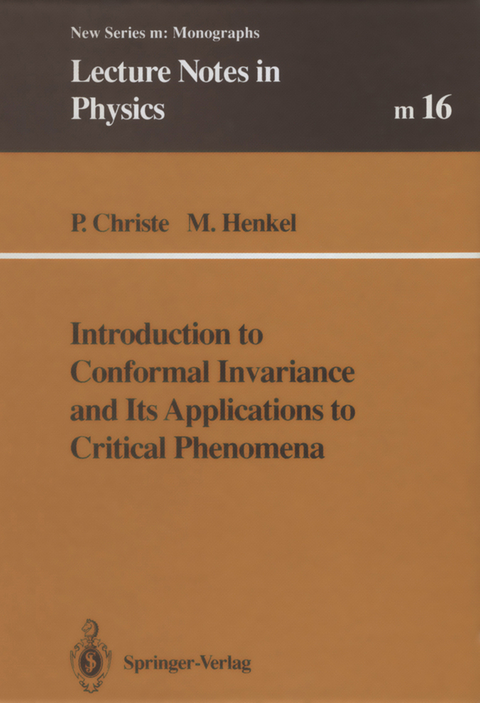
Introduction to Conformal Invariance and Its Applications to Critical Phenomena
Seiten
2014
|
1. Softcover reprint of the original 1st ed. 1993
Springer Berlin (Verlag)
978-3-662-13922-6 (ISBN)
Springer Berlin (Verlag)
978-3-662-13922-6 (ISBN)
The history of critical phenomena goes back to the year 1869 when Andrews discovered the critical point of carbon dioxide, located at about 31°C and 73 atmospheres pressure. In the neighborhood ofthis point the carbon dioxide was observed to become opalescent, that is, light is strongly scattered. This is nowadays interpreted as comingfrom the strong fluctuations of the system close to the critical point. Subsequently, a wide varietyofphysicalsystems were realized to display critical points as well. Ofparticular importance was the observation of a critical point in ferromagnetic iron by Curie. Further examples include multicomponent fluids and alloys, superfluids, superconductors, polymers and may even extend to the quark-gluon plasmaand the early universe as a whole. Early theoretical investigationstried to reduce the problem to a very small number of degrees of freedom, such as the van der Waals equation and mean field approximations and culminating in Landau's general theory of critical phenomena. In a dramatic development, Onsager's exact solutionofthe two-dimensional Ising model made clear the important role of the critical fluctuations. Their role was taken into account in the subsequent developments leading to the scaling theories of critical phenomena and the renormalization group. These developements have achieved a precise description of the close neighborhood of the critical point and results are often in good agreement with experiments. In contrast to the general understanding a century ago, the presence of fluctuations on all length scales at a critical point is today emphasized.
Critical Phenomena: a Reminder.- Conformal Invariance and the Stress-Energy Tensor.- Finite Size Scaling.- Representation Theory of the Virasoro Algebra.- Operator Algebra and Correlation Functions.- The Ising Model Correlation Functions.- Coulomb Gas Realization.- The Hamiltonian Limit and Universality.- Numerical Techniques.- Conformal Invariance in the Ising Quantum Chain.- Modular Invariance.- Further Developments and Applications.- Conformal Perturbation Theory.- The Vicinity of the Critical Point.- Surface Critical Phenomena.- Outlook: Beyond the Conformal Group.
| Erscheint lt. Verlag | 23.8.2014 |
|---|---|
| Reihe/Serie | Lecture Notes in Physics Monographs |
| Zusatzinfo | XV, 260 p. |
| Verlagsort | Berlin |
| Sprache | englisch |
| Maße | 170 x 244 mm |
| Gewicht | 487 g |
| Themenwelt | Naturwissenschaften ► Physik / Astronomie ► Thermodynamik |
| Schlagworte | Atmosphere • carbon • Carbon dioxide • Development • Experiment • hamiltonian • iron • Operator algebra • Quark • Renormalization Group • Solution • Superconductor • System • Tensor • Universe |
| ISBN-10 | 3-662-13922-7 / 3662139227 |
| ISBN-13 | 978-3-662-13922-6 / 9783662139226 |
| Zustand | Neuware |
| Haben Sie eine Frage zum Produkt? |
Mehr entdecken
aus dem Bereich
aus dem Bereich
Hauptsätze, Prozesse, Wärmeübertragung
Buch | Softcover (2023)
De Gruyter Oldenbourg (Verlag)
CHF 62,90


